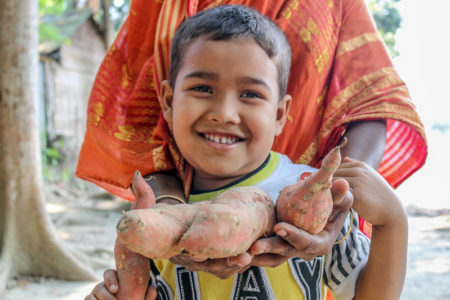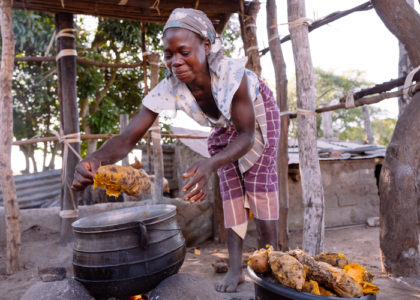 The government of the United Kingdom has long supported efforts to reduce micronutrient malnutrition by helping vulnerable populations in Africa and Asia grow and eat nutritious crops. Between 2013 and 2019, UK Aid funding allowed the International Potato Center (CIP) and partners to deliver pro-vitamin A-rich, orange-fleshed sweetpotato varieties to more than 2.3 million families in five African countries and Bangladesh. A new phase of support is building on that success to significantly scale up the development and delivery of nutrient-rich, climate-resilient staple crops, including sweetpotato.
The government of the United Kingdom has long supported efforts to reduce micronutrient malnutrition by helping vulnerable populations in Africa and Asia grow and eat nutritious crops. Between 2013 and 2019, UK Aid funding allowed the International Potato Center (CIP) and partners to deliver pro-vitamin A-rich, orange-fleshed sweetpotato varieties to more than 2.3 million families in five African countries and Bangladesh. A new phase of support is building on that success to significantly scale up the development and delivery of nutrient-rich, climate-resilient staple crops, including sweetpotato.
Funded by the UK Department of International Development (DFID) and implemented by an international research partnership of CIP and HarvestPlus, this three-year program will use cutting edge research and conventional techniques to breed varieties of crops with elevated levels of vitamin A, iron or zinc – a process called biofortification. Regular consumption of these super crops improves people’s diets and health statuses and contributes to tackling two of the biggest challenges facing the global food system – micronutrient malnutrition and food insecurity.
The new program targets vulnerable populations where micronutrient deficiencies are highest, including women of reproductive age, adolescent girls and children under five, with a goal of reaching at least 67 million people in the developing world by 2023. These low-income populations will gain access to, produce, and consume nutrient-dense foods.

CIP will explore new sustainable and cost-effective delivery models for scaling up pro-vitamin A sweetpotato, while compiling evidence on the efficacy and impact of its approach. The initiative will facilitate the creation of a sweetpotato breeding platform in Bangladesh and strengthen existing regional platforms in eastern, western and southern Africa. In addition to overseeing the development of at least 12 new climate-resilient sweetpotato varieties, CIP will promote the exchange between countries of high performing nutritious varieties.
While CIP focuses on beta-carotene-rich, orange-fleshed sweetpotato, HarvestPlus and partners will promote biofortified beans, cassava, maize, pearl millet, rice and wheat. Research has shown that eating orange-fleshed sweetpotato reduces vitamin A deficiency, a condition that results in varied health problems, hinders child development, and causes approximately 500,000 children to go blind each year. Sweetpotato also produces plenty of calories relatively quickly and with few inputs, making it an excellent food security crop as well, and it is an increasingly important cash crop.
CIP will promote innovative partnerships and business models to extend the economic and nutritional benefits of beta-carotene-rich sweetpotato and related products to greater numbers of people in a cost-effective way. The growing use of sweetpotato in processed foods has potential to improve smallholder farmers’ incomes and increase the availability of affordable, safe and nutritious food to low-income consumers and communities in emergencies or protracted crisis environments.
While past DFID support enabled the expansion of sweetpotato cultivation and consumption in Kenya, Malawi, Mozambique and Rwanda, as well as in Bangladesh and Tanzania, the current initiative will include Ethiopia, Nigeria and Uganda, while providing technical support in additional countries.
While improving the food and nutritional security of millions of families, this initiative will contribute to a strong evidence base that should inspire and inform future investments in the promotion of biofortified crops in developing countries.
Learn more: https://hdl.handle.net/10568/103468

